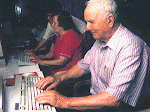 |
| Two Cuban drug dealers, shown here looking for customers in a Miami park |
"We had just gotten to the dog park near my condo when it happened," Blaze explained. "Chauncey began to act erratically, pulling on the leash and barking. He was afraid for his life and began to panic, and he was breathing faster than usual with his tongue sticking out of his mouth. I was scared, but that's when the training kicked in."
In the line of duty, Corporal Blaze has had more than his fair share of experience with this dangerous and mysterious drug, which some police toxicologists believe is like heroin on crack, and then on steroids. In addition to suffering from one of the first known cases of mosquito-borne fentanyl overdose, Blaze continues to have chronic fentanyl overdose symptoms almost two years later. "I've come a long way, but knowing that there are traces of fentanyl still somewhere in my body that could strike at any moment is enough to give me a panic attack. And I worry about Chauncey because we just don't know much about the effects of fentanyl on dogs since there aren't doctors for animals."


